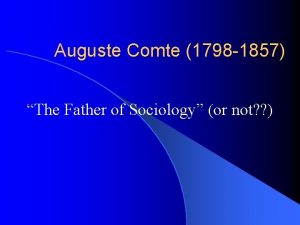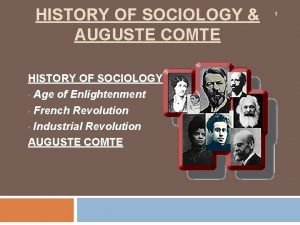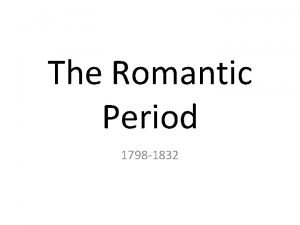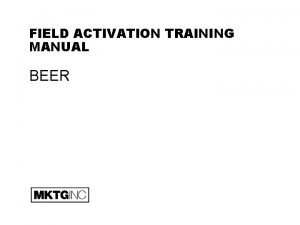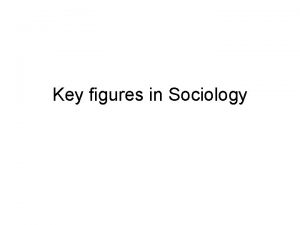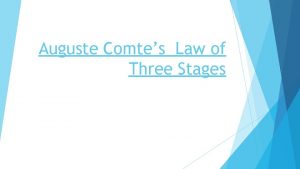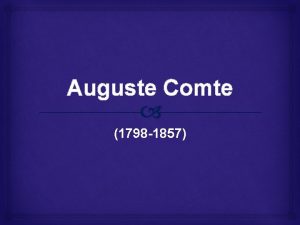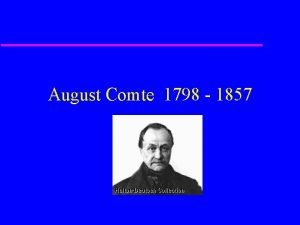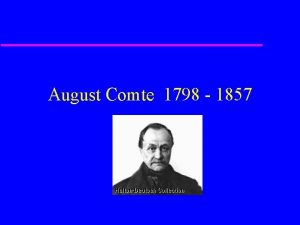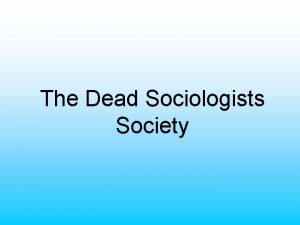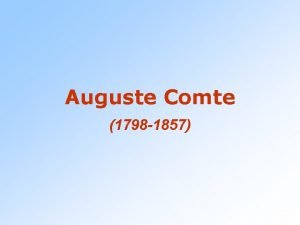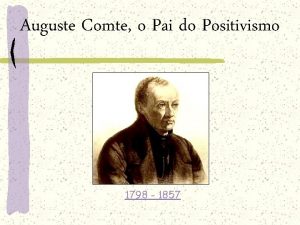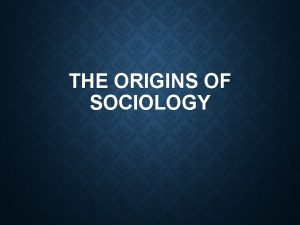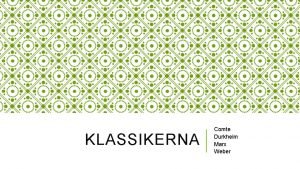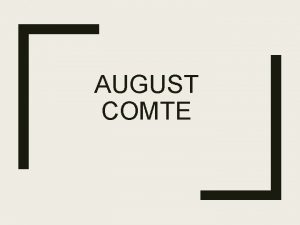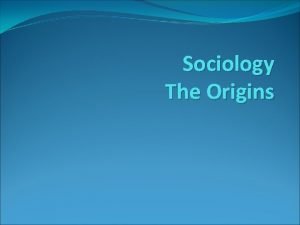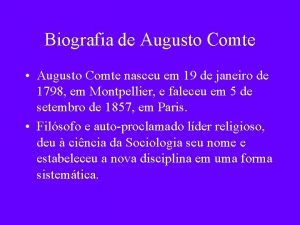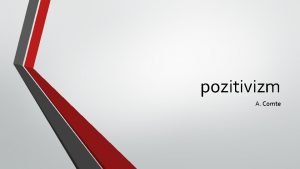The Origins of Sociology August Comte 1798 1857




























- Slides: 28

The Origins of Sociology August Comte (1798 -1857) q. Considered the Founder of Modern Sociology q. Coined the phrase: Sociology (1838) q. Described Sociology as having three stages: §Theological §Metaphysical §Scientific

The Origins of Sociology August Comte (1798 -1857) q Favored positivism — a way of understanding based on science q Strongly influenced the academic discipline of Sociology in the United States

The Origins of Sociology August Comte (1798 -1857) The term sociology comes from: Latin – socius (friend or associate) Greek – logos (word) -------------“words about human associations”

The Origins of Sociology Karl Marx (1818 -1883) q. Saw striking inequalities in the new industrial society. q. Known for Marxist Sociology and the Social- Conflict Approach

The Origins of Sociology GENDER & RACE: Marginal Voices Harriet Martineau Jane Addams (1802 -1876) (1860 -1935) W. E. B. Du Bois (1868 -1963)

3 Perspectives of Sociology

The Structural–Functional Paradigm n. The structural-functional paradigm sees society as a complex system whose parts work together. n. It asserts that our lives are guided by social structures. Herbert Spencer Emile Durkheim Robert Merton

Functionalist: Focus on Social Order –Focuses on the social order -Sees social change as harmful. -Inspired by sociologists Herbert Spencer and Emile Durkheim.

Functionalist: Focus on Social Order -Each part of society performs certain functions for the society as a whole, and the parts are interdependent -GREEF Model Government Religion Education Economy Family/Friends

Functionalist: Focus on Social Order -What holds society together is social consensus – most members of society agree on what would be good for everybody and then cooperate to achieve it. -Social consensus can be either in the form of mechanical or organic solidarity.

Functionalist: Focus on Social Order -Mechanical Solidarity: a type of social cohesion that develops when people do similar work and have similar beliefs and values. -This exists in relatively small-scale, traditional societies. (Ex: small farming community)

Functionalist: Focus on Social Order -Organic Solidarity: a type of social cohesion that arises when the people in a society perform a wide variety of specialized jobs and therefore have to depend on one another. -This is characteristic in complex, industrialized societies. (Ex: U. S. society)

Functionalist: Focus on Social Order - European sociologists used functionalism to explain society as a whole – to clarify how order and stability were maintained. - American sociologists have been more interested in discovering the functions of specific types of human behavior.

Functionalist: Focus on Social Order -Sociologist Robert Merton classified functions of society into two types: Manifest and Latent -Manifest Functions – are intended and obvious. Example: go to college to get an education. -Latent Functions – are unintended and often unrecognized. Example: go to college and find a wife.

Functionalist: Focus on Social Order Criticisms: -The functionalist perspective by itself can’t lead to a complete picture of social events. -It has also been criticized for focusing on the positive functions of social events, and ignoring the negative. -The application of functionalism to analyze society has been criticized for being inherently conservative.

The Social–Conflict Paradigm n. The social-conflict paradigm sees society as an arena of inequality that generates conflict and change. n. Critical evaluation: This paradigm has developed rapidly in recent years. Karl Marx W. E. B. Du Bois

Conflict: Focus on Social Conflict -Sees social change as beneficial. -Assumes that the social order is imposed by the powerful on the weak.

Conflict: Focus on Social Conflict - This perspective is critical of the status quo. - It emphasizes that groups or societies have conflicting interests and values and compete with each other for scarce resources. The more powerful groups gain more than the less powerful, but the former continue to seek more wealth and power while the latter continue to struggle for scarce resources. -Because of this perpetual competition, society or the world is always changing.

Conflict: Focus on Social Conflict -This perspective originated with Karl Marx, and gained popularity in the U. S. during the Civil Rights Movement. (Marx saw conflict between economic groups, but today, conflict theorists define social conflict to mean conflict between any unequal groups in society. )

Conflict: Focus on Social Conflict Criticisms: The conflict perspective has been criticized for overly stressing social conflict and other negative aspects of society while ignoring the order, stability and other positive aspects of society.

The Symbolic–Interaction Paradigm n. The symbolic-interaction paradigm sees society as the product of the everyday interactions of individuals. Max Weber George Herbert Mead

Symbolic Interactionist: Focus on Social Interactions -Looks at specific situations in everyday life and the kinds of social interactions that are taking place. -Meaning is assigned to human interaction

Symbolic Interactionist: Focus on Social Interactions -People respond to their own interpretations of physical things -Because people constantly impose interpretations and then act accordingly, human behavior is fluid, always changing.

Symbolic Interactionist: Focus on Social Interactions -George Herbert Mead introduced symbolic interactionism to sociology in the 1920 s -Max Weber is considered to have shaped Symbolic Interactionist persepective. -Weber argued people act according to their interpretation of the meaning of their social world. -Verstehen Method (pronounced fair- SHTAY-in)

Symbolic Interactionist: Focus on Social Interactions According to symbolic interactionism, people assign meanings to each other’s words and actions. Our response to a person’s action is therefore determined not by that person’s action in and of itself but by our subjective interpretation of that person’s action. Example: When we speak to a friend, an observer can easily give an objective report of the words we have said. But our friend’s response will depend not on the list of words we spoke but on our friend’s interpretation of the entire interaction, and our friends response is at the same time influencing what we are saying.

Symbolic Interactionist: Focus on Social Interactions How we act is constantly being altered by how we interpret other people’s actions and their reactions to our own behavior. Human behavior is thus not real in and of itself but becomes real only after it has been subjected to “reality construction, ” the process by which we interpret what a given action means and respond to it in accordance with the interpretation.

Symbolic Interactionist: Focus on Social Interactions The symbolic interactionist perspective is very useful for understanding why and how we interact with others, something that we do during most of our waking hours. Criticisms: But the perspective has been criticized for ignoring the larger issues of national and international order and change. It has also been faulted for ignoring the influence of larger social forces such as social institutions, groups, cultures, and societies on individual interactions.

Multiple View -The idea that each perspective is useful because we can’t take everything into account in such a complex world. -People gain an integrated view of society by using all three perspectives together.
 Biografia de augusto comte
Biografia de augusto comte Auguste comte achievements
Auguste comte achievements Sociolgist
Sociolgist Revolt of 1857 to 1947
Revolt of 1857 to 1947 What is tebhaga movement
What is tebhaga movement The british administrative structure in india(1765-1857)
The british administrative structure in india(1765-1857) Dred scott vs. sandford 1857
Dred scott vs. sandford 1857 Indian rebellion of 1857 ap world
Indian rebellion of 1857 ap world Project on revolt of 1857
Project on revolt of 1857 Ferdinand de saussure (1857-1913)
Ferdinand de saussure (1857-1913) Présentation
Présentation The united states emerges as a world power
The united states emerges as a world power Chapter 3 the european period answers
Chapter 3 the european period answers The romantic period 1798 to 1832 summary
The romantic period 1798 to 1832 summary Imperialism political cartoon
Imperialism political cartoon Landergemmolen
Landergemmolen The romantic age (1798 to 1824)
The romantic age (1798 to 1824) Romantic period 1798 to 1832
Romantic period 1798 to 1832 The romantic period 1798 to 1832 summary
The romantic period 1798 to 1832 summary The romantic age (1798 to 1824)
The romantic age (1798 to 1824) Rumfordov pokus 1798
Rumfordov pokus 1798 British literature romantic period
British literature romantic period The era of change 1798-1832
The era of change 1798-1832 Guinness the 1798 limited edition
Guinness the 1798 limited edition Key figures of sociology
Key figures of sociology Domaine du comte peraldi
Domaine du comte peraldi Metaphysical stage
Metaphysical stage La sociologia moderna
La sociologia moderna Lei dos tres estados
Lei dos tres estados
